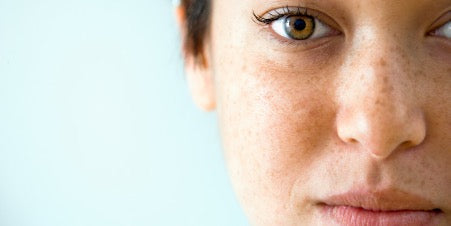Pigmentation, hyperpigmentation, melasma, dark spots - what does it all mean and more importantly, how do we treat it?
Ever looked in the mirror and spotted those stubborn dark patches that seem to appear out of nowhere? If you're nodding along, there’s a chance you may have some form of pigmentation. Skin pigmentation is actually a super common concern that affects all skin types and tones. While it can be frustrating to deal with, the great news is that there are tried and tested ways to tackle it. Whether you’re dealing with freckles, melasma, or those annoying post-acne marks, we’ve got you covered with expert tips and products that will get you to an even skin tone in no time.
So, what exactly is pigmentation, and more importantly, what should you do about it? Let’s dive in, shall we?
First things first, what is skin pigmentation?
Like all skin-related concerns, the first step to effective treatment is understanding its type and cause. Simply put, pigmentation refers to the colouring of your skin. It’s all about melanin, the pigment that gives your skin, hair, and eyes their natural colour. Sometimes, your skin produces too much melanin, causing darker patches or spots to form. This can happen for various reasons, like sun exposure, hormonal changes, or even after skin inflammation (think acne scars that leave a mark long after the breakout is gone).
What are the different types of pigmentation?
Not all pigmentation is made equal either, here are the main types of pigmentation people deal with.
Melasma
Often called the 'mask of pregnancy,' melasma is typically triggered by hormonal changes and worsened by sun exposure. It usually appears as brown or grey or dark patches on the face.
Freckles
Cute? Absolutely. But if you're looking to minimise them, freckles are small, flat spots that show up when melanin accumulates after sun exposure. If they’re raised, it may be time to pay a visit to your dermatologist.
Hyperpigmentation
Got a breakout or injury? Post-inflammatory hyperpigmentation or PIH is the leftover dark mark that sticks around long after your skin has healed. It’s the unwanted gift that keeps on giving unfortunately.
Sunspots
These are flat, brown spots that develop over time from too much sun. They often pop up in areas that see the sun the most like your face, hands, or décolletage.
How to treat skin pigmentation
The good news is it’s not all doom and gloom and there are a number of effective treatments when it comes to pigmentation. Here are a few of the main ones:
Invest in a good exfoliator
This one is probably self-explanatory, but exfoliation is key when it comes to treating pigmentation. Exfoliating helps to slough away dead skin cells that may be contributing to dullness and uneven skin tone. By encouraging cell turnover, exfoliating can help to fade dark spots more quickly, revealing fresher, brighter skin underneath. But exfoliating doesn’t have to be a physical or harsh exfoliant, in fact, for pigmentation this is not advised.
Instead, opt for a chemical peel or exfoliator like the Skinsmiths’ Resurfacing AHA/BHA Peel. This multi-acid exfoliating peel is inspired by professional clinic treatments, designed to resurface and revitalise your skin, targeting uneven pigmentation for a clearer, more radiant glow. AHAs and BHAs are ideal when it comes to treating pigmentation because they provide both surface and deeper exfoliation which can help to lighten inflammation that may be living deeper under the skins surface.
Brightening serums
Probably the number one ingredient that will pop up in any pigmentation related quest is vitamin-C. And for good reason. Vitamin C blocks the enzyme tyrosinase, which is responsible for creating melanin (the stuff that causes dark spots). Not only does it fade sunspots and post-acne marks, but it also helps stop new ones from forming. Vitamin C also improves your skin's overall glow, leaving it fresh, bright, and revitalised. It’s a must-have for anyone looking to even out their skin tone and say goodbye to stubborn pigmentation.
The PRO Strength Vitamin C Serum is the fan-favourite antioxidant solution that targets and reduces pigmentation while preventing future dark spots. This serum has been clinically proven to reduce the appearance of dark spots by 25% making it perfect for those dealing with pigmentation.
Keep your skin hydrated and healthy
Hydrated skin equals healthy skin. And one often overlooked aspect of treating pigmentation is keeping your skin properly hydrated. When your skin is dry, it can make pigmentation appear more prominent and your complexion can look dull overall. A good moisturiser can help to maintain your skin’s moisture barrier, ensuring that your skin stays plump, healthy, and radiant.
The Rebalancing Moisturiser is the perfect all-rounder. Scientifically proven to fight off the signs of ageing, this formula also helps reduce trans-epidermal water loss, keeping your skin feeling hydrated and looking radiant no matter what life throws at it, pigmentation included.
Daily sunscreen
Whether or not you suffer from pigmentation, daily sunscreen should really be a non-negotiable. But, if you are prone to pigmentation or dark spots, it’s even more crucial. That’s because the sun can trigger pigmentation and make existing spots even darker. Use a broad-spectrum SPF every single day, rain or shine people! Skinsmiths' Daily Antioxidant Defence SPF30 has your back (and your face). More than just a sunscreen, this multitasker is packed with multi-layer hydration that plumps and smooths your skin effortlessly. It’s also been carefully crafted to be gentle, even for sensitive skin types, which is common for people prone to pigmentation.
Treat pigmentation from the inside out
While topical skincare products are absolutely crucial when it comes to treating pigmentation and keeping it at bay, there are also lifestyle factors that play a role too. Antioxidants are not just effective at treating pigmentation on the outside, eating a diet rich in antioxidants, like berries, green leafy vegetables, and nuts, can help to protect your skin from oxidative stress, which can contribute to pigmentation. Omega-3 fatty acids, found in fish and flaxseed, also help to keep your skin hydrated and supple.
Avoiding excessive sun exposure, smoking, and stress will also benefit your skin in the long run. And don’t forget to stay consistent with your skincare routine, pigmentation isn’t something that disappears overnight, but with the right lifestyle and products, you can make a huge difference over time.
When is it time to bring in the experts?
If you’ve been consistently following the steps above and not seeing any results, it may be time to explore more intensive alternatives. For more severe pigmentation, laser treatments are one of the most effective options available. Laser treatments work by targeting the excess melanin in your skin, breaking it up so that it can be naturally eliminated by your body.
If lasers aren’t your thing microneedling is also a fantastic treatment. This in-clinic treatment involves using tiny, controlled needles to create micro-injuries in the skin. These injuries trigger your skin’s natural healing process, boosting collagen production and, over time, reducing the appearance of pigmentation.
All sound a bit hard?
Look, we get it. Researching and shopping around for loads of individual products can be daunting and draining. Which is why we’ve done all the hard work for you and created our Rituals. Each Ritual is created with a specific skin concern in mind from redness to acne and yes, there is one specifically designed for those suffering from pigmentation. Our Brighten and Glow Essentials Kit.
This kit has everything you need in one go. Packed with antioxidant-rich formulas designed to give you that brighter, glowing complexion you’ve been craving. With all the key players we’ve mentioned above, plus a few extra for experts like the Purifying Gel Cleanser for a fresh start, the Resurfacing AHA/BHA Peel to smooth and renew, and the PRO Strength Vitamin C Serum to brighten and even out skin tone.
Plus, you’ll get the PRO Collagen Eye Complex to plump and hydrate the delicate eye area, the Rebalancing Moisturiser to lock in hydration, and the Daily Antioxidant Defence SPF30 to protect your skin from UV damage. And the best part? You save up to 40% making it the easiest and most effective way to maintain beautiful skin at home, no fuss, no stress!
And there you have it folks, everything you need to tackle pigmentation like a pro. Whether you’re ready to dive into individual products or you want the convenience of a complete kit, Skinsmiths has all the products you could ever need. But remember, skincare is a journey, not a race, so stick with it and try to enjoy the glow-up process. While it can be stressful and time consuming, it’s also incredibly rewarding when you see the results you’ve always dreamed of.





